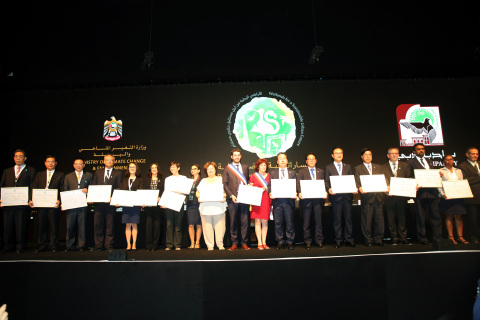DUBAI, United Arab Emirates--(BUSINESS WIRE)--Six Chinese cities were awarded the Wetland City Accreditation at the 13th Meeting of the Contracting Parties to the Ramsar Convention on Wetlands (COP13) in Dubai, in appreciation of China’s commendable efforts on the conservation and wise use of wetlands.
Changde, Changshu, Dongying, Haerbin, Haikou and Yinchuan were the six Chinese cities to win the Wetland City Accreditation, which aims to underline the importance of urban wetlands for making cities livable, from providing drinking water through to reducing floods and filtering waste.
It was introduced this year by the Ramsar Convention – an intergovernmental treaty – to encourage cities that are close to and depend on wetlands, and to establish a positive relationship with wetlands through increased awareness and consideration of them in the local planning and decision making.
Hosted by the UAE Ministry of Climate Change and Environment and sponsored by Dubai Municipality, COP13 is a platform for member states to plan wetlands policy and discuss their progress for the next three years, vote on 26 draft resolutions, and discuss a range of ongoing and emerging environmental issues.
“The rapid decline of wetlands has received the attention of governments around the world and I would like to commend China’s efforts through wetland conservation and restoration projects,” said His Excellency Dr Thani bin Ahmed Al Zeyoudi, Minister of Climate Change and Environment. “As a pioneer in the region for environmental efforts, the UAE is honoured to host COP13 and use the event as a platform to drive international cooperation to protect these valuable ecosystems that have an impact on our lives, society and our future.”
Ma Guangren, Secretary General of the China Wetland Conservation Association, also received a Merit Award at COP13 for his significant contributions for wetlands conservation in China and Asia.
“The Chinese government has introduced many new laws and regulations for the protection of our wetlands in the past decade, under the guidance of the Ramsar Convention. However, challenges do remain, such as the lack of scientific and technological support, and insufficient public awareness of the significance of wetlands,” said Ma Guangren, Secretary General of China Wetland Conservation Association.
“I believe that international cooperation and the sharing of best practices is important for us to draw on the wisdom and experience of others around the world. It is a great honour for me to receive this award in recognition of the work that has gone into the protection and wise use of wetlands and its resources.”
Ma has contributed to the establishment of wetland conservation regulations, investigation and monitoring, project planning, publicity and education and an international cooperation system. He persuaded the Central Government of China to invest $1.3 billion (9 billion Chinese yuan) to implement national wetland conservation and restoration projects. Ma also helped set up the National Ramsar Implementation Committee, and the China Wetland Conservation Association, and has developed networks for the Conservation of the Yangtze River, Yellow River and coastal wetlands, as well as initiated various environmental and public awareness education activities.
The total wetlands area in China is 53,602,600 hectares, comprising marine/coastal wetlands, riverine wetlands, lake wetlands, marshy wetlands and human-made wetlands. China joined the Ramsar Convention in 1992, and has since designated 57 Wetlands of International Importance covering more than 6.9 million hectares. These sites provide a range of critical benefits and services to people and nature. They are biodiversity hotspots and provide habitat for a wide range of endemic and threatened species, including critically endangered species such as the Chinese pangolin, the Chinese sturgeon, and birds such as Baer’s pochard, the Siberian crane and the yellow-breasted bunting. They also serve as wintering, breeding and resting sites for a variety of migratory birds.
The recently launched Global Wetlands Outlook (GWO) by the Ramsar Convention on Wetlands highlights that the world’s wetlands are declining rapidly, with 35 per cent losses since 1970. Authors of the report also stressed the need for immediate action, lest there be serious repercussions for the future. Findings from the GWO will inform discussions and decisions at COP13.
The other cities to be given the Wetland City Accreditation were Amiens, Courteranges, Pont-Audemer and Saint-Omer in France, Tata in Hungary, Republic of Korea’s Changnyeong, Inje, Jeju and Suncheon, Mitsinjo in Madagascar, Colombo in Sri Lanka and Ghar el Melh in Tunisia.
About COP13
The 13th Meeting of the Conference of the Contracting Parties to the Ramsar Convention on Wetlands (COP13) is held in Dubai, UAE from October 21 to 29, 2018, under the theme of “Wetlands for a Sustainable Urban Future”. Hosted by the UAE Ministry of Climate Change and Environment and sponsored by Dubai Municipality, representatives from governments of Contracting Parties will convene at COP13 to agree on a work programme, budgetary arrangements for the next triennium and consider guidance on a range of ongoing and emerging environmental issues. Representatives of non-member states, intergovernmental institutions and non-governmental organizations (NGOs) also participate in these meetings as non-voting observers.
The UAE has been a party to the Ramsar Convention on Wetlands since 2007, and has designated 7 wetland sites, with a surface area of 34,978 hectares, onto the List of Wetlands of International Importance (Ramsar Sites), considered to be of high value to the country and to the world because of the ecosystem services they provide. Although the UAE is situated in one of the most arid regions in the world, the wetland ecosystem in the country is one of the most unique and diverse in the Arabian Peninsula. It includes marshes, vast tidal flats, fresh water aquifers, mangroves and coral reefs.
*Source: AETOSWire




